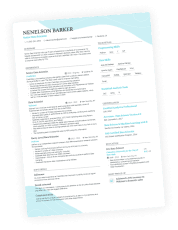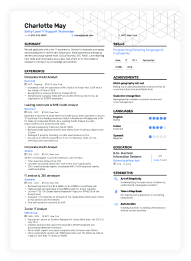Keep it simple: Use your first and last name as your email address. Avoid using numbers or symbols, as they can appear unprofessional. Emails such as john.doe@gmail.com are great for business purposes.
Truth is ever to be found in simplicity, and not in the multiplicity and confusion of things.
Isaac Newton
In that spirit, if there’s one key piece of advice to remember when selecting a professional email address for your resume, it's to keep it simple.
Let’s look into choosing the right email for your resume. Should you stick with your school email or go for a more professional option? Which email provider should you use? Is it okay to have a nickname as your email address? We’ll cover all these questions and even share some examples to guide you.
Curious if the right email really makes a difference? Keep reading, and we'll explain how a smart email choice can help your resume make its way to the “to-be-interviewed” list.
What email address should I use for my resume?
Believe it or not, your email address can really set the tone for your professionalism, and it's one of the simplest yet most effective ways to make a good impression on recruiters. You might not think much about it, but having a professional email address for your resume is crucial when applying for a job. So, it's important to avoid anything that might seem unprofessional or quirky.
Keep in mind that your email address needs to be in the header section of your resume and is often one of the first details recruiters notice. If it lacks professionalism, it could overshadow even the most impressive resume. Make sure your email address reflects the image you want to show.
Why are professional email addresses important?
In today's digital age, the email address you choose plays a crucial role in your working life. It's an inevitable part of your digital business card. That's the reason why you should make it look vocational. Here are 4 important points why this matters.
- Good first impressions: A professional email creates a good first impression, showing you’re serious about your professional interactions.
- Credibility: It boosts your reliability by showing you care about details in your professional image.
- Easy to remember: If it includes your name, it's useful for networking and keeping in touch with new people.
- Relevance: They avoid the risk of being seen as unprofessional, unlike emails with nicknames or excessive numbers.
Should I use a school or a college email on my resume?
We know you might be using your school or college email, but keep in mind, that they usually discontinue it a few months after you've graduated, so you’d better leave it off your resume. Moreover, a personal email address that includes your name tends to look more professional than a school email, which might have arbitrary numbers or letters. Besides, you're more likely to continue checking a personal email regularly long after your education ends.
Creating a simple, professional email address with a popular provider like Gmail or Outlook can help you maintain a consistent and professional image throughout your job search and future career communications. Go for a simple, professional email from a reliable provider to keep everything looking sharp.
Next, we'll talk about the best email domains for your resume, so don’t go anywhere.
Which email service provider is best for a resume?
According to market research conducted by Gitnux, among SMBs (small and midsize business) in the US, about 47%, rely on free email services like Gmail or Yahoo for their business communications.
If you’re wondering which email service is best for your resume, choose one that’s well-known for being reliable and professional. That way, you can be sure your emails will get through without landing in the spam folder. Let's check out some good service providers:
- Gmail: It's super popular and easy to use, not to mention it comes with great spam protection and works seamlessly with other Google services.
- Yahoo: It's been around for a while and may not be as trendy as before, but it remains a dependable option that's well-regarded in professional circles.
- Outlook: This one's part of the Microsoft family, so it's got loads of features perfect for business, like great organization tools and good integration with Office apps.
Each of these providers is well-regarded, so you can't really go wrong.
With more than 1.5 billion users, Gmail stands as the most widely used email service.
Professional email address examples
When crafting a professional email address for your resume, it's essential to choose one that reflects both credibility and simplicity. This can influence first impressions and establish a positive tone for future interactions.
While many people have several names, for a professional email address, it's best to use just the names you are commonly known by. An example could be maria.fernandez@gmail.com, which is simple, memorable, and vocational.
Now we'll explore a variety of examples of professional email addresses that you can use as inspiration.
- Simple name format: FirstName.LastName@gmail.com (e.g., John.Doe@gmail.com) or FirstInitial.LastName@yahoo.com (e.g., J.Doe@yahoo.com)
- First name with middle initial and last name: FirstName.M.LastName@gmail.com (e.g., John.A.Doe@gmail.com) or FirstName.MLastName@outlook.com (e.g., JohnADoe@outlook.com)
- Name with dots or underscores:FirstName.MiddleName.LastName@gmail.com (e.g., John.Alexander.Doe@gmail.com) or FirsName_LastName@gmail.com (e.g., John_Doe@gmail.com)
Tips for creating a professional email address
We know how much you value practical tips, so we made sure to include a special section just for that in our guide. Below, you’ll find straightforward advice on selecting an email address that really lines up with your professional objectives and helps you make that good impression every time.
Our list begins with a piece of advice we touched on earlier in this article, but it's so crucial we think it's worth mentioning again.
- Keep it simple: Use your first and last name as your email address. Avoid using numbers or symbols, as they can appear unprofessional. Emails such as john.doe@gmail.com are great for business purposes. If your name is already taken, consider adding a middle name or an initial, changing the order of your names in your email address, or abbreviating your first name to an initial.
- Be consistent: Use the same email address across all your professional platforms, including your resume, LinkedIn profile, and any other professional networks.
- Check for typos: Double-check your email address for typos and errors, as a misspelled email address could result in your resume being sent to the wrong recipient or not reaching the intended recipient at all.
- Make it easy to say out loud: Create an email address that's memorable and easy to pronounce. For example, if you're Sarah Bennett, "s.bennett" might be a better choice than "sarah.b,".
PRO TIP
If you have your own domain name, consider using an email address associated with it. For example, if your domain name is "johndoe.com", your email address could be "john.doe@johndoe.com".
Unprofessional email address examples
To wrap up our article, we'd like to point out the email addresses you shouldn't ever use in business. We highly recommend avoiding unprofessional or inappropriate email addresses because they can undermine your credibility and signal a lack of seriousness about your career.
Listed below are examples that aren't appropriate for your professional life:
- Nickname-based: funkybunny123@gmail.com
- Overly casual or silly: partyparrot4ever@outlook.com
- Complicated with numbers and symbols: xX_john_1994_Xx@yahoo.com
- Inappropriate content: hotstuff42@hotmail.com
- Outdated service providers: coolguy88@AOL.com
According to the Public Relations Society of America, 76% of resumes are discarded due to unprofessional email addresses.
Key takeaways
Alright, let's review the key highlights and main takeaways from the article.
- Choose an email address that's straightforward and simple, such as using your first and last name.
- Your email address serves as crucial contact information on your resume, so having a professional one can significantly enhance your credibility.
- School or college emails are temporary and can be deleted, so pick a permanent email provider.
- Go with well-known email services like Gmail, Outlook, or Yahoo, as they are recognized for reliability and professionalism.
- Make sure your email address suits the vocational image you want to project.
- Make sure to use an email address that you check regularly to avoid missing any important messages, such as interview invitations.
Make one that's truly you.



